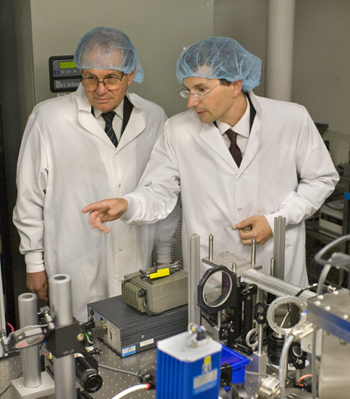Orbach Lays Out Ambitious Agenda for Next Six Months
|
|
 |
 |
|
|
Wim Leemans (AFRD), right, explains the laser wakefield accelerator to Orbach |
|
|
|
Raymond Orbach, the Under Secretary for Science at the U.S. Department of Energy (DOE) visited Berkeley Lab on Friday and addressed Laboratory employees at noon in the Bldg. 50 Auditorium. Although the Under Secretary clearly expects to leave office when the next President in inaugurated on January 20, 2009, he does not intend to merely count the days in the meantime. Orbach laid out an ambitious agenda driven by four priorities for the next six months, which are designed to carry the Office of Science forward into the next administration.
“We have restructured the Office of Science with regards to its career employees as our first priority,” Orbach said. “This may sound bureaucratic, but it will help ensure continuity in our research programs during the transition to a new administration. That was not the case in 2002 when I took office.”
Orbach’s second priority is to ensure that “every one of our national laboratories has a positive future and is well on its way to achieve its goals.” Again, continuity is the key. Scientific business plans have been articulated, he said, which will help Congress and the next Administration know where each lab is going, what it wants to accomplish and what it will need to reach its goals.
His third priority is to “break down some of the stovepipes” within the Office of Science budget. For the first time ever in the budget process, he said, there are six integrated programs that bring together basic and applied research under one coordinated plan.
“Again, the goal is to give us (Office of Science) a continuum between basic research enterprise, the applications and hopefully the market,” Orbach said.
The fourth priority was “stockpile stewardship,” the program for testing and maintaining nuclear weapons without actually carrying out nuclear testing, for which the Office of Science now has responsibility.
Another major remaining task that Orbach is addressing in his final months is a filling out the “20 Year Facility Outlook,” a roadmap for the design and construction of new facilities, which was issued in 2002.
“What we did at the time was to divide the period between 2002 and 2022 into three epochs,” Orbach said. “At the time we did this, it seemed like an awful long period, but the first epoch is already essentially over and if you look back, we’ve accomplished pretty much all we set out to do.”
While Orbach described the second epoch as “a little fuzzier,” we are still well on our way towards reaching its goals. However, the third epoch merely lists blank placeholders for the facilities that will be needed at that time, and Orbach said that his goal for the next six months is to fill in those blanks.
“We will be meeting with the key leaders and scientific staffs of the national labs, our advisory committees and associate directors to have in place at least a first estimate as to what will be needed in that third epoch,” Orbach said.
Orbach has served at the helm of the Office of Science, the third largest Federal sponsor of basic research in the U.S. and our nation’s primary supporter of the physical sciences, since March 14, 2002. Prior to that he served 10 years as Chancellor of UC Riverside, and before that was for many years a physics professor at UCLA. One of his students was Robert Birgeneau, now the Chancellor at UC Berkeley. Chancellor Birgeneau introduced Orbach to the crowd of Berkeley Lab employees gathered to hear Orbach’s address.
“Ray Orbach has been one of my heroes, as a scientist and as an administrator, for most of my career,” the Chancellor said. “I want to thank him for the phenomenal support he has given to the Lab and to the Berkeley campus.”
Berkeley Lab director Steve Chu in his welcoming remarks said that when he was a physicist studying energy transfer at Bell Labs, Orbach’s scientific papers on energy transfer were considered “must reads.” Now, as Under Secretary for Science, Chu said, “It is only appropriate that Ray has spent a great deal of energy trying to transfer science to the marketplace.”
Orbach, in his closing remarks, said that his time at the head of the Office of Science had been a great experience for him, one for which he was grateful and one that he would recommend to others.
“Federal service is a wonderful opportunity to be able pay back all of the investments that you had fun with as a researcher in this country,” Orbach said. “My service has been a joy that has illuminated my personal and family life over these past six years. The success of this Laboratory, and the wonderful opportunities that you have created here and the future you have laid out for our country has been a major part of that joy. So let me thank you for what you have done and I look forward to a very bright future for the Lawrence Berkeley National Laboratory.”
|

